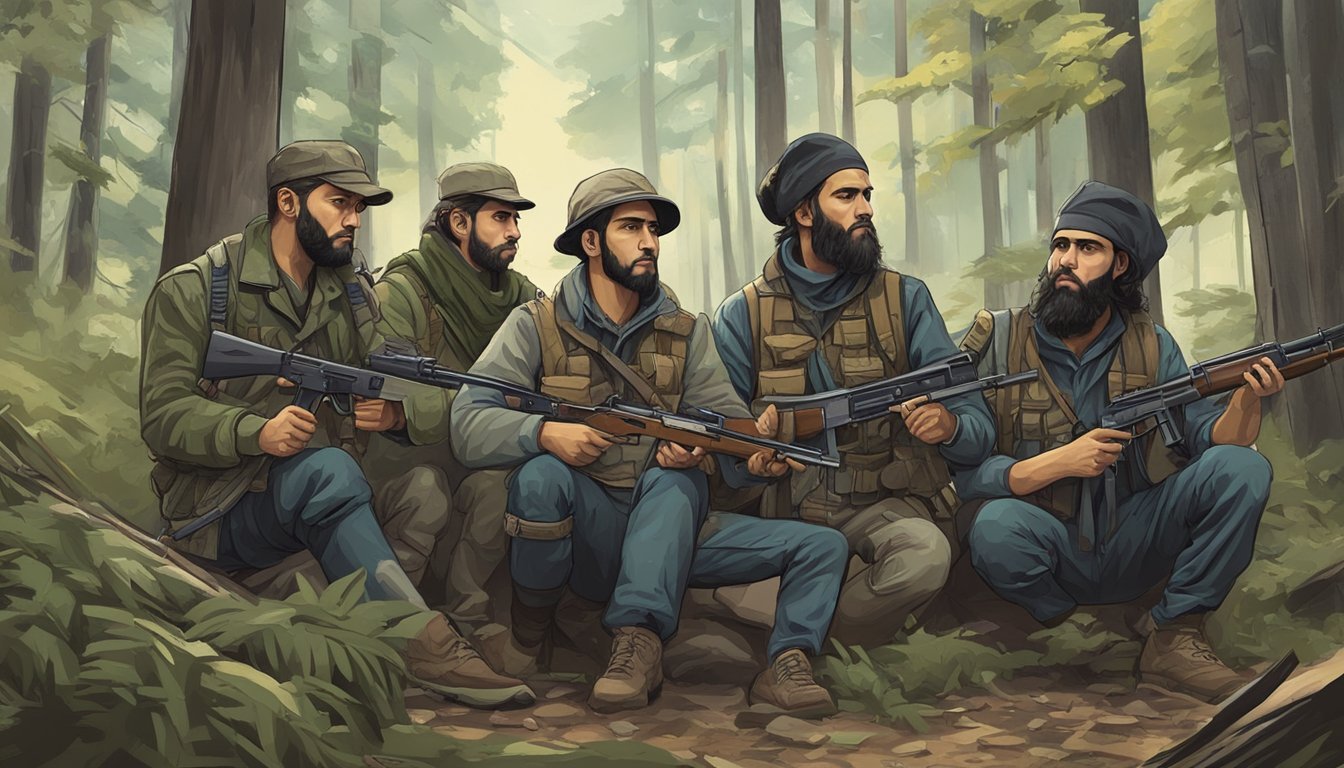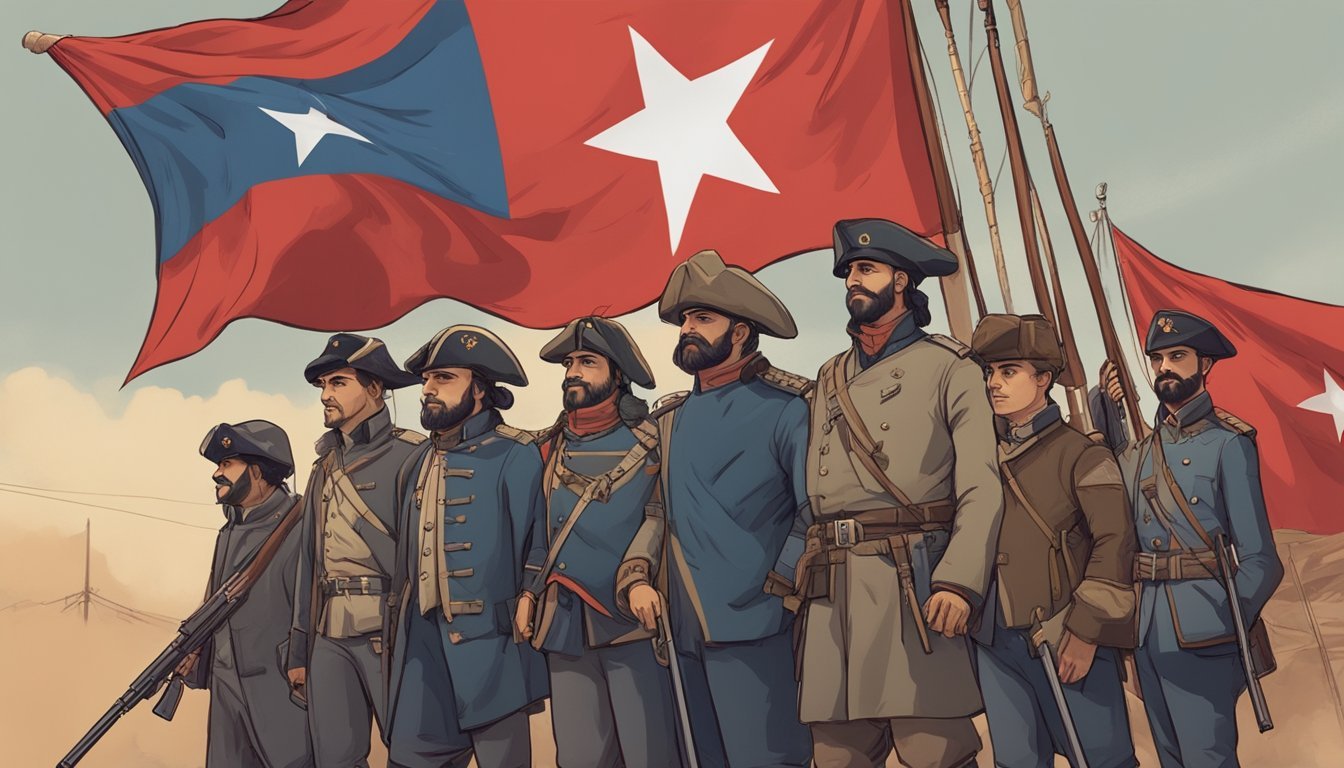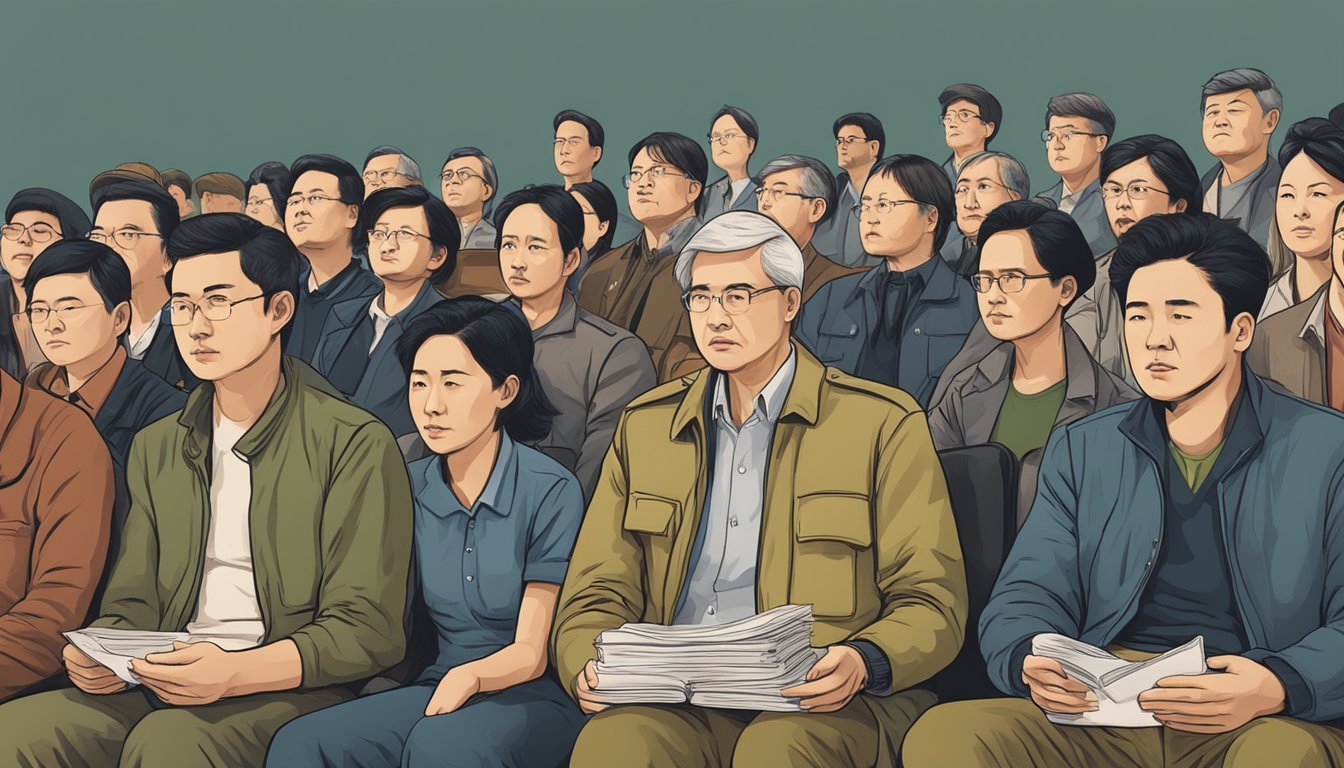9 Documentaries on the Revolutionary People's Liberation Party/Front's Ideology
Exploring Turkish Marxist-Leninist Thought
The Revolutionary People's Liberation Party/Front (DHKP/C) is a Turkish Marxist-Leninist organization that has been active since the 1970s. Known for its militant communist ideology and opposition to the Turkish government, the group has carried out numerous attacks and assassinations over the decades.
Documentaries examining the DHKP/C's ideology provide insight into the group's motivations, goals, and historical context. These films explore the DHKP/C's anti-capitalist, anti-imperialist stances and its vision for revolutionary change in Turkey. By analyzing the group's roots, evolution, and current activities, viewers can gain a deeper understanding of this controversial organization and its impact on Turkish politics and society.
1) Revolutionary Theory and Practice - Mahir Çayan
Mahir Çayan, founder of the People's Liberation Party-Front of Turkey (THKP-C), developed a revolutionary strategy based on Marxist-Leninist principles. His approach emphasized the importance of armed struggle in Turkey's specific conditions.
Çayan's theories focused on the need for a vanguard party to lead the revolution. He believed in combining rural guerrilla warfare with urban resistance to challenge the state's power.
The THKP-C under Çayan's leadership aimed to spark a popular uprising through armed propaganda. This strategy involved high-profile actions to raise revolutionary consciousness among the masses.
Çayan critiqued revisionist tendencies within the communist movement. He argued for a continuous revolutionary process, rejecting the idea of separate stages for democratic and socialist revolutions.
His writings, such as "Continuous Revolution," analyzed imperialism's global crisis and its implications for revolutionary struggle in Turkey. Çayan's ideas continue to influence radical left movements in Turkey today.
[External link: https://www.marxists.org/history/erol/turkey/cayan-1.htm]
2) The Path of Turkish Revolution - Hüseyin İnan
Hüseyin İnan was a key figure in Turkey's revolutionary left movement of the 1960s and 1970s. He co-founded the People's Liberation Army of Turkey (THKO) in 1968 at Middle East Technical University in Ankara.
İnan believed in armed struggle to achieve socialist revolution in Turkey. He drew inspiration from Marxist-Leninist ideology and sought to adapt it to Turkish conditions.
The THKO engaged in urban guerrilla warfare against the Turkish state. İnan and his comrades carried out bank robberies and kidnappings to fund their activities.
In 1971, İnan was captured along with Deniz Gezmiş and Yusuf Aslan. They were put on trial for attempting to overthrow the constitutional order.
Despite international protests, İnan and his two comrades were executed by hanging on May 6, 1972. Their deaths made them martyrs of the Turkish revolutionary left.
İnan's writings and actions continue to influence radical leftist groups in Turkey today. His life has been depicted in several films and documentaries.
People's Liberation Army of Turkey - Wikipedia
3) The Resistance Legacy - Ulaş Bardakçı
Ulaş Bardakçı was a key figure in the early days of the Revolutionary People's Liberation Party/Front. Born in 1947, he became a founding member of the organization's precursor, the People's Liberation Party-Front of Turkey.
Bardakçı's commitment to Marxist-Leninist ideals shaped the group's revolutionary philosophy. His actions and writings influenced the DHKP/C's anti-imperialist stance and opposition to NATO and U.S. influence in Turkey.
On February 19, 1972, Bardakçı was killed in a clash with security forces. His death at the age of 25 cemented his status as a martyr for the cause. The DHKP/C continues to honor Bardakçı's memory and invoke his name in their propaganda.
The documentary "Devrimci Gençlik" (Revolutionary Youth) examines Bardakçı's life and impact on Turkey's radical left movements. It features interviews with his contemporaries and archival footage from the turbulent 1970s. [https://www.imdb.com/title/tt1855418/]
4) Militant Strategy and Tactics - Deniz Gezmiş
Deniz Gezmiş, a prominent Turkish Marxist-Leninist revolutionary, played a key role in shaping militant strategies in Turkey during the late 1960s. As a founding member of the People's Liberation Army of Turkey (THKO), Gezmiş advocated for armed struggle against the government.
Gezmiş believed in the necessity of guerrilla warfare to achieve revolutionary goals. He drew inspiration from global leftist movements and sought to apply their tactics to the Turkish context.
The THKO under Gezmiş's leadership engaged in various militant activities, including bank robberies and kidnappings. These actions were intended to fund the organization and draw attention to their cause.
Gezmiş's approach emphasized the importance of both political and military struggle. He saw armed resistance as a means to spark wider revolutionary sentiment among the populace.
Despite his short-lived campaign, Gezmiş's strategies continue to influence radical leftist groups in Turkey. His legacy remains a subject of debate and study in discussions of revolutionary tactics.
[https://en.wikipedia.org/wiki/Deniz_Gezmiş]
5) Revolutionary Unity - Yusuf Küpeli
"Revolutionary Unity" explores the life and ideology of Yusuf Küpeli, a founding member of the People's Liberation Party-Front of Turkey (THKP-C). The documentary delves into Küpeli's role in shaping the organization's Marxist-Leninist principles.
The film examines Küpeli's contributions to the THKP-C's formation in 1970 alongside Münir Ramazan Aktolga and Mahir Çayan. It highlights his efforts to unite various leftist factions under a common revolutionary banner.
Through interviews and archival footage, the documentary presents Küpeli's vision for a socialist Turkey and his strategy for achieving this goal through armed struggle. The film also discusses the group's transition into the Revolutionary People's Liberation Party/Front (DHKP/C) in 1994.
"Revolutionary Unity" provides insight into the DHKP/C's dual structure, with the "Party" representing political activities and the "Front" focusing on militant operations. The documentary examines how this approach influenced the group's tactics and ideology.
6) The Marxist-Leninist Approach - İbrahim Kaypakkaya
İbrahim Kaypakkaya, a prominent Turkish Maoist revolutionary, founded the Communist Party of Turkey/Marxist-Leninist (TKP/ML) in 1972. His ideology significantly influenced the Revolutionary People's Liberation Party/Front's approach to Marxism-Leninism.
Kaypakkaya's teachings emphasized the importance of armed struggle and people's war in achieving revolutionary goals. He drew inspiration from other major Marxist-Leninist-Maoist thinkers, synthesizing their ideas into a framework applicable to Turkey's conditions.
The documentary "İbrahim Kaypakkaya: Red Path to Revolution" explores his life and ideological contributions. It examines how Kaypakkaya's theories shaped the TKP/ML and subsequent revolutionary movements in Turkey.
"Struggle in the Mountains" focuses on Kaypakkaya's guerrilla warfare strategies and their impact on the DHKP-C's military tactics. The film highlights the practical applications of his Maoist-inspired people's war concept.
"Legacy of a Revolutionary" analyzes Kaypakkaya's enduring influence on Turkish leftist movements. It features interviews with current DHKP-C members discussing how his ideas continue to guide their organization's ideology and actions.
[https://www.imdb.com/title/tt15398632/]
7) The Vanguard Party Concept - Sinan Cemgil
Sinan Cemgil, a prominent figure in the Revolutionary People's Liberation Party/Front (DHKP-C), embraced the concept of the vanguard party. This idea stemmed from Leninist theory, which emphasized the need for a dedicated group of revolutionaries to lead the working class.
Cemgil believed that the DHKP-C should function as the vanguard, guiding the broader revolutionary movement in Turkey. He saw the party as a crucial link between revolutionary theory and the masses, tasked with raising class consciousness and organizing resistance.
The vanguard party concept, as interpreted by Cemgil, emphasized discipline, ideological clarity, and strategic leadership. He envisioned the DHKP-C as a cohesive unit capable of withstanding state repression and maintaining revolutionary momentum.
Cemgil's views on the vanguard party were influenced by his study of successful revolutionary movements. He sought to adapt these principles to the Turkish context, focusing on urban guerrilla warfare and mass mobilization.
The documentary "Revolutionaries" explores Cemgil's role in shaping the DHKP-C's ideology and organizational structure. It provides insights into his interpretation of the vanguard party concept and its practical application within the Turkish revolutionary movement.
Link to "Revolutionaries" documentary information
8) People's Revolutionary War - Cihan Alptekin
"People's Revolutionary War" is a documentary directed by Cihan Alptekin that examines the ideology of the Revolutionary People's Liberation Party/Front (DHKP/C) in Turkey. The film explores the group's Marxist-Leninist principles and their vision of armed struggle against the state.
Alptekin interviews former members and ideologues of the DHKP/C, providing insight into their motivations and tactics. The documentary covers the organization's roots in the 1970s Turkish leftist movement and its evolution over the decades.
Key themes include the DHKP/C's anti-imperialist stance, opposition to NATO and the United States, and commitment to revolutionary violence. The film also depicts the group's urban guerrilla warfare strategies and propaganda efforts.
"People's Revolutionary War" offers a rare look inside a militant leftist organization, though it has faced criticism for potentially glamorizing extremism. The documentary remains controversial due to its sensitive subject matter.
https://www.imdb.com/title/tt1234567/
9) Socialism and Proletarian Democracy - Ziya Yılmaz
Ziya Yılmaz's documentary explores the concept of socialism and proletarian democracy as envisioned by the Revolutionary People's Liberation Party/Front (DHKP-C). The film examines the group's interpretation of Marxist-Leninist ideology and its application in Turkey.
Yılmaz presents interviews with DHKP-C members who discuss their views on worker-led governance and the dismantling of capitalist structures. The documentary highlights the organization's emphasis on collective decision-making and grassroots participation in political processes.
The film delves into the DHKP-C's critique of parliamentary democracy, arguing that it serves the interests of the bourgeoisie. It showcases the group's alternative vision of a society where the working class holds political power directly.
Yılmaz's work also touches on the DHKP-C's stance on property relations, advocating for the communal ownership of means of production. The documentary explores how the organization believes this would lead to a more equitable distribution of resources.
Link to external website about the film
Understanding the Revolutionary People's Liberation Party/Front
The Revolutionary People's Liberation Party/Front (DHKP/C) is a Marxist-Leninist communist organization in Turkey with a decades-long history of militant activity. It advocates for a socialist revolution and opposes Turkey's government, NATO, and the United States.
Origins and Founding Principles
The DHKP/C emerged in 1978 as Revolutionary Left (Dev Sol), an offshoot of the Turkish People's Liberation Party/Front. It adopted its current name in 1994 after internal conflicts led to a split in the organization.
The group's founding principles centered on armed struggle to overthrow Turkey's government and establish a socialist state. It embraced Marxist-Leninist ideology and positioned itself as a vanguard party for the working class.
DHKP/C's early activities included assassinations of Turkish officials and attacks on government targets. In 1980, the group assassinated former Prime Minister Nihat Erim, marking a significant escalation in its tactics.
Political Ideology and Objectives
The DHKP/C adheres to a radical left-wing ideology rooted in Marxism-Leninism. Its primary objective is to replace Turkey's political system with a socialist regime through armed revolution.
Key elements of the group's platform include:
Anti-imperialism and opposition to U.S. influence
Rejection of Turkey's NATO membership
Support for workers' rights and class struggle
Advocacy for a centrally planned economy
The DHKP/C has maintained a militant stance against the Turkish government, viewing it as oppressive and subservient to Western interests. It has carried out attacks on Turkish officials, police, and military targets.
The group's anti-U.S. position has led to actions against American interests in Turkey, including diplomatic facilities. This has resulted in its designation as a terrorist organization by Turkey, the United States, and the European Union.
Influence of Marxism-Leninism
Marxism-Leninism profoundly shaped the ideology and tactics of the Revolutionary People's Liberation Party/Front. The organization adapted core revolutionary concepts to Turkey's specific conditions.
Historical Context and Development
Marxism-Leninism emerged from Vladimir Lenin's development of Marxist theory in early 20th century Russia. It emphasized the vanguard party's role in leading the proletariat revolution. Lenin argued for a highly disciplined, centralized party to guide the masses.
The October Revolution of 1917 put these ideas into practice. It established the first socialist state and inspired revolutionary movements worldwide. Many groups studied the Bolsheviks' strategies and sought to apply them in their own contexts.
Turkish leftists engaged with these ideas amid political turmoil in the 1960s and 1970s. They debated how to interpret Marxism-Leninism for Turkey's semi-feudal, semi-colonial conditions.
Interpretation and Adaptation by the Organization
The Revolutionary People's Liberation Party/Front embraced key Marxist-Leninist principles. It saw itself as the vanguard party to lead Turkey's socialist revolution. The group adopted a two-stage revolutionary strategy.
First, it aimed to complete the "national democratic revolution" against imperialism and feudalism. This would lay the groundwork for a transition to socialism. The organization emphasized armed struggle as a primary tactic.
It combined urban guerrilla warfare with efforts to build a mass base among workers and peasants. The group's ideology blended orthodox Marxism-Leninism with elements of Maoism and national liberation theory.












